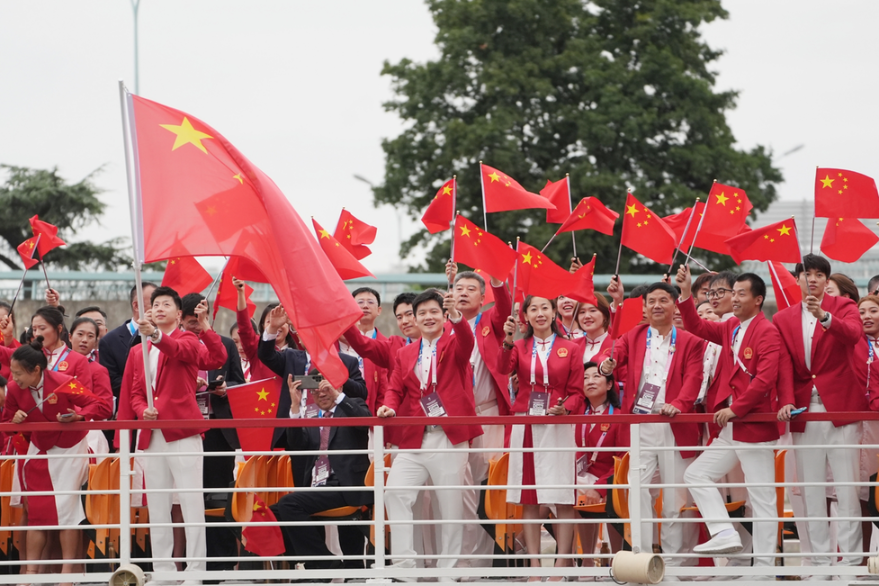Foreign trade set to stay resilient this year
By WANG KEJU and LIU ZIZHENG | CHINA DAILY | Updated: 2024-04-20 07:32

China's foreign trade, buoyed by the steady upturn of the domestic economy and an improved trading structure increasingly driven by high-tech and green products and export market diversification, will continue to exhibit resilience this year, according to officials and executives on Friday.
That said, weighed down by sluggish external demand, intensifying geopolitical tensions and rising trade protectionism, the growth of the country's foreign trade is not without challenges, they said, calling for more forceful measures to help businesses better navigate the complex international landscape.
"The performance of foreign trade is closely linked to the domestic economy," Guo Tingting, vice-minister of commerce, said at a news conference, adding that the GDP of the world's second-largest economy grew 5.3 percent year-on-year in the first quarter, providing a solid foundation for consolidating the fundamentals of foreign trade.
Moreover, business expectations are consistently improving, as shown by a recent survey conducted by the ministry among over 20,000 exhibitors at the ongoing Canton Fair. The survey revealed that 81.5 percent of the respondents reported an increase or stability in their orders, marking a 16.8-percentage-point increase from the previous session.
Chinese manufacturers have been focusing on developing and exporting products which are technologically advanced, environmentally friendly and possess high added value, fueling the country's efforts to optimize its trading mix, said Li Xingqian, director-general of the ministry's department of foreign trade.
The combined export value of new energy vehicles, lithium batteries and solar products, known as the "new three items", for instance, stood at 1.06 trillion yuan ($146.39 billion) last year, up 29.9 percent year-on-year. Additionally, industrial robot exports soared by 86.4 percent year-on-year, data from the General Administration of Customs showed.
As the world shifts toward a low-carbon economy, demand has surged for environmentally friendly and sustainable products. The "new three items" have become highly sought-after in the global market, said Xu Yingming, a researcher at the Chinese Academy of International Trade and Economic Cooperation.
Through continuous innovation, some Chinese companies have achieved a certain level of technological superiority and product excellence, allowing them to offer high-quality, competitive products that meet international standards and drive their robust export growth, Xu added.
The country's efforts to expand trade relations with a broader range of partners, especially those involving the Belt and Road Initiative, also enhances the resilience of its foreign trade sector.
In 2023, the share of exports to emerging markets rose to 55.3 percent. Trade relations with countries involved in the Belt and Road Initiative have also deepened, as evidenced by the first-quarter figures of this year, in which exports to those nations accounted for 46.7 percent of total exports, according to the ministry.
Noting the company's focus on Europe and the United States as the mainstay of its NEV export market, Chen Lide, the regional manager of Asia's Second Division at Zhongtong Bus, said that these markets accounted for more than half of the company's export share last year.
However, there has been a recent surge in inquiries from potential clients in emerging markets, including Africa and South Asia. These untapped markets present significant opportunities for further exploration, Chen added.
Though these favorable conditions will help put China's foreign trade in a better position to sustain sound momentum, various challenges such as geopolitical tensions and trade protectionism will remain tough nuts to crack.
The World Trade Organization said on Wednesday that it expects world merchandise trade volume to increase by 2.6 percent in 2024, 0.7 percentage point lower than the forecast made last October.
The world is witnessing a growing number of geopolitical conflicts, such as the ongoing Israeli-Palestinian conflict with its spillover effects, and the blockage of the Red Sea shipping route, which are causing significant disruption and uncertainties on various fronts, said Guo, the vice-minister of commerce.
In particular, heightened trade protectionism makes it more difficult for Chinese businesses to venture into foreign markets. The recent probes by the European Union and the US into Chinese NEVs, which are based on unfounded allegations, serve as an example.
"It is not a surprise that the US and some developed economies tend to adopt restrictive measures against China in areas where China starts showing growing competitiveness," said Huo Jianguo, vice-chairman of the China Society for World Trade Organization Studies.
"As long as Chinese enterprises act in line with international rules and maintain competitiveness with products which are of high quality and low cost and offer improved customer services, those restrictive measures will only create temporary difficulties and obstacles, but will not stop us from forming a new competitive advantage in those emerging areas."
























